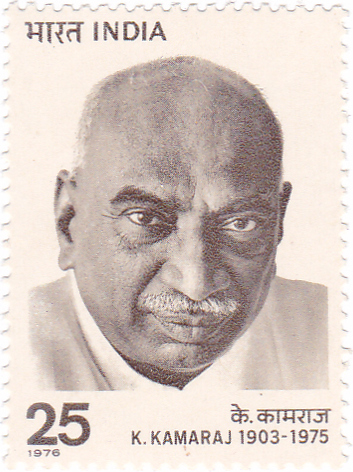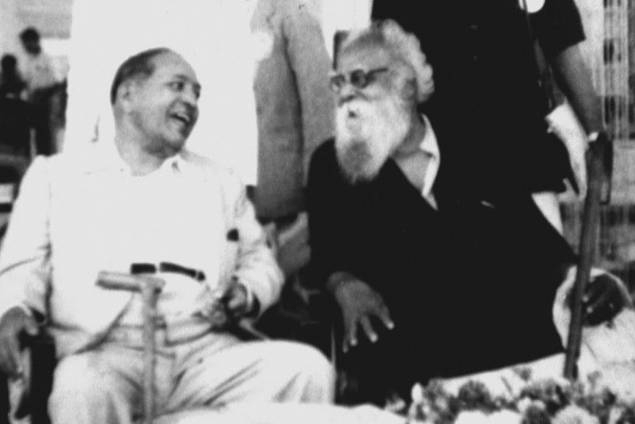|
1957 Madras Legislative Assembly Election
The second legislative assembly election to the Madras state (presently Tamil Nadu) was held on 31 March 1957. This was the first election held after the linguistic reorganization of Madras state in 1954. Indian National Congress and its leader K. Kamaraj won the election, and defeated its rival Dravida Munnetra Kazhagam. In 1954, due to the resignation of C. Rajagopalachari, for his controversial Kula Kalvi Thittam, the leadership of Congress was contested, between K. Kamaraj, and C. Subramaniam (who got the support of M. Bhaktavatsalam). Eventually, K. Kamaraj, won the support of the party, was elected leader and chief minister of Madras State in 1954. In a surprise move, he appointed both M. Bhaktavatsalam and C. Subramaniam, in his cabinet, allowing great unity amongst Congress, that ruled the state of Madras, for the next decade. This election saw future DMK leaders, M. Karunanidhi and K. Anbazhagan winning their first MLA seat in the legislative assembly. Delimitati ... [...More Info...] [...Related Items...] OR: [Wikipedia] [Google] [Baidu] |
Legislature Of Tamil Nadu
The Tamil Nadu Legislature is the unicameral legislature of the Indian state of Tamil Nadu. The Legislature is composed of Tamil Nadu Legislative Assembly and the Governor of Tamil Nadu Until 1 November 1986, the Tamil Nadu Legislature was a bicameral legislature consisting of: * the Tamil Nadu Legislative Council, the upper house, * the Tamil Nadu Legislative Assembly, the lower house, and * the Governor of Tamil Nadu In 2010, the erstwhile Dravida Munnetra Kazhagam (DMK) Government took steps to revive the Tamil Nadu Legislative Council and convert the legislature back into a bicameral one, but the administration left power during this time and was unable to continue. The All India Anna Dravida Munnetra Kazhagam (AIADMK) Government which assumed power in 2011, expressed its intent not to revive the Tamil Nadu Legislative Council. See also *Elections in Tamil Nadu *Government of Tamil Nadu References External linksOfficial website Unicameral legislatures Legislature ... [...More Info...] [...Related Items...] OR: [Wikipedia] [Google] [Baidu] |
Andhra Pradesh And Madras Alteration Of Boundaries Act
Andhra Pradesh and Madras (Alteration of Boundaries) Act, 1959, enacted by the Parliament of India under the provisions of article 3 of the constitution, went into with effect from 1 April 1960. Under the act, Tirutani taluk and Pallipattu sub-taluk of Chittoor district of Andhra Pradesh were transferred to Madras State in exchange for territories from the Chingelput (Chengalpattu) and Salem Districts.Government of Tamil Nadu — Tamil Nadu Secretariat — Brief History A total of 319 villages from three different s of Chitoor district and a small forest area were transferred from Andhra Pradesh to Madras State in exchange for 148 villages of Chingelput district an ... [...More Info...] [...Related Items...] OR: [Wikipedia] [Google] [Baidu] |
INC Flag Official
Inc. or inc may refer to: * Incorporation (business), as a suffix indicating a corporation * ''Inc.'' (magazine), an American business magazine * Inc. No World, a Los Angeles-based band * Indian National Congress, a political party in India * Increment, in computer programming languages, particularly assembler mnemonics * Incumbent The incumbent is the current holder of an official, office or position, usually in relation to an election. In an election for president, the incumbent is the person holding or acting in the office of president before the election, whether seek ..., the current holder of a political office See also * INC (other) {{disambig ... [...More Info...] [...Related Items...] OR: [Wikipedia] [Google] [Baidu] |
India Madras Legislative Assembly 1957
India, officially the Republic of India (Hindi: ), is a country in South Asia. It is the seventh-largest country by area, the second-most populous country, and the most populous democracy in the world. Bounded by the Indian Ocean on the south, the Arabian Sea on the southwest, and the Bay of Bengal on the southeast, it shares land borders with Pakistan to the west; China, Nepal, and Bhutan to the north; and Bangladesh and Myanmar to the east. In the Indian Ocean, India is in the vicinity of Sri Lanka and the Maldives; its Andaman and Nicobar Islands share a maritime border with Thailand, Myanmar, and Indonesia. Modern humans arrived on the Indian subcontinent from Africa no later than 55,000 years ago., "Y-Chromosome and Mt-DNA data support the colonization of South Asia by modern humans originating in Africa. ... Coalescence dates for most non-European populations average to between 73–55 ka.", "Modern human beings—''Homo sapiens''—originated in Africa. Then, int ... [...More Info...] [...Related Items...] OR: [Wikipedia] [Google] [Baidu] |
Dravidar Kazhagam
Dravidar Kazhagam is a social movement founded by Periyar E. V. Ramasamy, also called Thanthai Periyar. Its original goals were to eradicate the ills of the existing caste system including untouchability and on a grander scale to obtain a "Dravida Nadu" (Dravidian nation) from the Madras Presidency. Dravidar Kazhagam would in turn give birth to many other political parties including Dravida Munnetra Kazhagam and later the All India Anna Dravida Munnetra Kazhagam. History Founded by Periyar E. V. Ramasamy, the roots of the Dravidar Kazhagam lie in the Self-Respect Movement and Justice Party (India), Justice Party. Periyar formed the Self-Respect Movement in 1925, breaking in the process from the Indian National Congress party, of which he had been a member until then. The Justice Party, formed in 1917, also claimed to promote similar interests. The two entities merged in 1938 under Periyar's leadership. The name was changed to Dravidar Kazhagam in 1944. Ideology Being comp ... [...More Info...] [...Related Items...] OR: [Wikipedia] [Google] [Baidu] |
Periyar E
Erode Venkatappa Ramasamy (17 September 1879 – 24 December 1973), revered as Periyar or Thanthai Periyar, was an Indian social activist and politician who started the Self-Respect Movement and Dravidar Kazhagam. He is known as the 'Father of the Dravidian movement'. He rebelled against Brahminical dominance and gender and caste inequality in Tamil Nadu.Thakurta, Paranjoy Guha; Shankar Raghuraman (2004). ''A Time of Coalitions: Divided We Stand''. Sage Publications. New Delhi. p. 230. . Since 2021, the Indian state of Tamil Nadu celebrates his birth anniversary as 'Social Justice Day'. Ramasamy joined the Indian National Congress in 1919, but resigned in 1925 when he felt that the party was only serving the interests of Brahmins. He questioned the subjugation of non-Brahmin Dravidians as Brahmins enjoyed gifts and donations from non-Brahmins but opposed and discriminated against non-Brahmins in cultural and religious matters. In 1924, Ramasamy participated in non-vio ... [...More Info...] [...Related Items...] OR: [Wikipedia] [Google] [Baidu] |
Dravida Nadu
:''Dravida Nadu was also the name of a Tamil language publication started by C. N. Annadurai.'' Dravida Nadu is the name of a proposed sovereign state demanded by the Justice Party led by the founder of the self-respect movement, E.V. Ramasamy Periyar, and the Dravida Munnetra Kazhagam (DMK) led by C. N. Annadurai for the speakers of the Dravidian languages in South India. Initially, the demand of Dravida Nadu proponents was limited to Tamil-speaking regions, but it was later expanded to include other Indian states with a majority of Dravidian-speakers (Andhra Pradesh, Telangana, Kerala and Karnataka). Some of the proponents also included parts of Ceylon (Sri Lanka), Orissa and Maharashtra. Other names for the proposed sovereign state included "South India", "Deccan Federation" and "Dakshinapath". The movement for Dravida Nadu was at its height from the 1940s to 1960s, but due to fears of Tamil hegemony, it failed to find any support outside Tamil Nadu. The States Reorganisati ... [...More Info...] [...Related Items...] OR: [Wikipedia] [Google] [Baidu] |
Congress Reform Committee
{{Use Indian English, date=July 2020 The Congress Reform Committee (CRC) was formed by a group of dissidents that left the Indian National Congress in the Madras State. The CRC was led by C. Rajagopalachari, who had been defeated by Kamaraj in the inner-party disputes over leadership of the Congress in Tamil Nadu. CRC was formed just one month before the 1957 elections to the Lok Sabha and the Madras state legislative assembly. Soon CRC began cooperation with the All India Forward Bloc of U. Muthuramalingam Thevar. The CRC-AIFB combine contested 59 seats in the assembly election (54 candidates from CRC, 5 candidates from AIFB. One of the five AIFB candidates, P.K. Mookiah Thevar, stood as a CRC candidate). There was also an informal understanding with the Communist Party of India, which decided not to contest against the CRC in some constituencies. The CRC-AIFB combine formulated a 12-point election manifesto. The CRC-AIFB alliance emerged as the major opposition alliance in t ... [...More Info...] [...Related Items...] OR: [Wikipedia] [Google] [Baidu] |
Socialist Party (India)
Socialist Party has been the name of several political parties in India, all of which have their roots in the Congress Socialist Party during the freedom struggle. Background Socialism had a late appearance in Indian politics and this was attributed to a preoccupation on the part of political activists with the independence movement. Differences in class, political perspectives, and economic objectives were set aside in favor of securing freedom from the British colonial rule. Specifically, socialist doctrines were even seen as a liability due to its theme of class conflict, which could have weakened national forces in their struggle for freedom. Once the socialist movement emerged, the Indian concept turned out to be different due to its rejection of the orthodox Marxist dogma or the so-called scientific socialist doctrines that focus on the dictatorship of the proletariat. The Indian model holds that socialism cannot be achieved through the State apparatus. One of its ratio ... [...More Info...] [...Related Items...] OR: [Wikipedia] [Google] [Baidu] |
Praja Socialist Party
The Praja Socialist Party, abbreviated as PSP, was an Indian political party. It was founded when the Socialist Party, led by Jayaprakash Narayan, Rambriksh Benipuri, Acharya Narendra Deva and Basawon Singh (Sinha), merged with the Kisan Mazdoor Praja Party led by J. B. Kripalani (former president of the Indian National Congress and a close associate of Jawaharlal Nehru). It led the cabinet under Pattom A. Thanu Pillai as chief minister of State of Travancore-Cochin from March 1954 to February 1955. A section led by Rammanohar Lohia broke from the party in 1955, resuming the name "Socialist Party". It again came to power in the new state of Kerala under Pattom A. Thanu Pillai from February 1960 to September 1962. In 1960, Kripalani left the party and in 1964, Asoka Mehta joined Congress after his expulsion from the party. Another section of the party, led by the trade union leader George Fernandes, broke off to become the Samyukta Socialist Party in 1969. In 1972, a section ... [...More Info...] [...Related Items...] OR: [Wikipedia] [Google] [Baidu] |
Forward Bloc
The All India Forward Bloc ( AIFB) is a left-wing nationalist political party in India. It emerged as a faction within the Indian National Congress in 1939, led by Subhas Chandra Bose. The party re-established as an independent political party after the independence of India. It has its main stronghold in West Bengal. The party's current Secretary-General is Debabrata Biswas. Veteran Indian politicians Sarat Chandra Bose (brother of Subhas Chandra Bose) and Chitta Basu had been the stalwarts of the party in independent India. History Formation of the Forward Bloc The Forward Bloc of the Indian National Congress is a Political Party that was formed on May 3, 1939 by Netaji Subhas Chandra Bose in Makur Unnao , Uttar Pradesh, who had resigned from the presidency of the Indian National Congress on 29 April after being outmaneuvered by Mohandas Karamchand Gandhi. The formation of the Forward Bloc was announced to the public at a rally in Calcutta. Bose said that who all were joinin ... [...More Info...] [...Related Items...] OR: [Wikipedia] [Google] [Baidu] |



